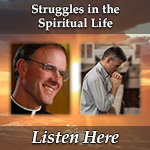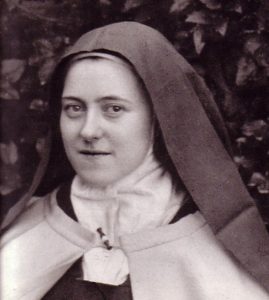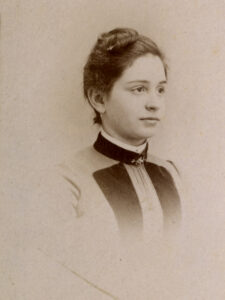Podcast: Play in new window | Download (Duration: 33:01 — 22.7MB) | Embed
Subscribe: Apple Podcasts | Spotify | Amazon Music | Android | Pandora | iHeartRadio | JioSaavn | Podchaser | Gaana | Podcast Index | Email | TuneIn | Deezer | Anghami | RSS | More

On Christmas Eve, the grand sweeping journey of salvation history comes to an important epoch with the “yes” of a virgin named Mary. From that point, the world is transformed forever. Msgr. Esseff challenges all of us to identify the tendency or flaw that cripples us. Give whatever that is to God. Christ has the power to heal you and change you into the person you were created to be. He encourages us to allow the Father in Heaven to embrace and love us.
Discerning Hearts questions for reflection on this episode:
- Understanding God’s Plan: Reflect on a time in your life when you felt that God was guiding you through a difficult situation. How did you perceive His presence and guidance during this time, and how has this experience influenced your faith and trust in God’s plan for your life?
- Role of the Sacraments: Consider the importance of the sacraments in your Catholic faith. How do sacraments like Baptism, Confession, the Eucharist, and Confirmation strengthen your relationship with God? What personal transformations or experiences have you had through participating in these sacraments?
- Living the Beatitudes: The Beatitudes are a central teaching of Jesus. Choose one Beatitude that resonates with you the most. How do you apply this Beatitude in your daily life, and what challenges and rewards have you encountered in trying to live out this teaching of Christ?
- Forgiveness and Reconciliation: Reflect on a time when you found it difficult to forgive someone or seek forgiveness. How did you overcome these challenges, and what role did prayer, reflection, or the teachings of the Church play in this process? How did this experience impact your understanding of God’s forgiveness?
- Personal Calling and Vocation: In what ways do you feel called by God to serve others and contribute to the Church’s mission? How do you discern your vocation or calling, and what steps are you taking to fulfill this calling in your daily life, whether through your career, volunteer work, family life, or community involvement?
Reading 1 2 Sm 7:1-5, 8b-12, 14a, 16
and the LORD had given him rest from his enemies on every side,
he said to Nathan the prophet,
“Here I am living in a house of cedar,
while the ark of God dwells in a tent!”
Nathan answered the king,
“Go, do whatever you have in mind,
for the LORD is with you.”
But that night the LORD spoke to Nathan and said:
“Go, tell my servant David, ‘Thus says the LORD:
Should you build me a house to dwell in?“‘It was I who took you from the pasture
and from the care of the flock
to be commander of my people Israel.
I have been with you wherever you went,
and I have destroyed all your enemies before you.
And I will make you famous like the great ones of the earth.
I will fix a place for my people Israel;
I will plant them so that they may dwell in their place
without further disturbance.
Neither shall the wicked continue to afflict them as they did of old,
since the time I first appointed judges over my people Israel.
I will give you rest from all your enemies.
The LORD also reveals to you
that he will establish a house for you.
And when your time comes and you rest with your ancestors,
I will raise up your heir after you, sprung from your loins,
and I will make his Kingdom firm.
I will be a father to him,
and he shall be a son to me.
Your house and your Kingdom shall endure forever before me;
your throne shall stand firm forever.’”
Gospel Lk 1:67-79
for he has come to his people and set them free.
He has raised up for us a mighty Savior,
born of the house of his servant David.
Through his prophets he promised of old
that he would save us from our enemies,
from the hands of all who hate us.
He promised to show mercy to our fathers
and to remember his holy covenant.
This was the oath he swore to our father Abraham:
to set us free from the hand of our enemies,
free to worship him without fear,
holy and righteous in his sight
all the days of our life.
You, my child, shall be called the prophet of the Most High,
for you will go before the Lord to prepare his way,
to give his people knowledge of salvation
by the forgiveness of their sins.
In the tender compassion of our God
the dawn from on high shall break upon us,
to shine on those who dwell in darkness and the shadow of death,
and to guide our feet into the way of peace.”
Lectionary for Mass for Use in the Dioceses of the United States, second typical edition, Copyright © 2001, 1998, 1997, 1986, 1970 Confraternity of Christian Doctrine;















